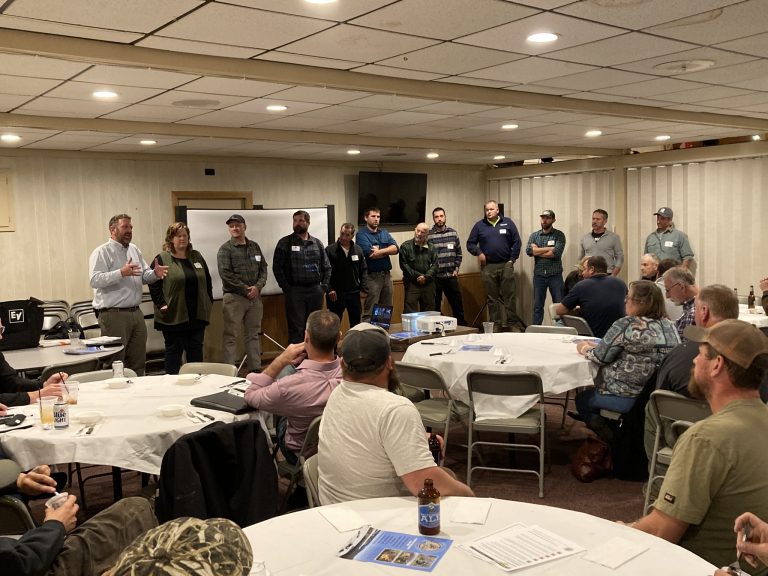Mechanized Logging Operations Program Underway for Summer 2021
MILFORD – Classes are now underway for students in the Mechanized Logging Operations Program (MLOP), which began its fifth year of classes June 28 in the woods northeast of Old Town.
Students enrolled in the college program at Northern Maine Community College (NMCC) will spend weeks harvesting timber using sophisticated state-of-the-art machines like those they will encounter in the logging industry. The hands-on experience students gain operating equipment is something unavailable anywhere else in Maine and neighboring states.
“There is no better, more affordable, more efficient way to gain the experience and knowledge you need to begin a successful career as an equipment operator in the logging industry than this program,” Dana Doran, Executive Director of the Professional Logging Contractors of Maine (PLC), said. “The Mechanized Logging Operations Program achieves results and as demand for operators continues to grow it is vital to meeting that need.”
“This project is a great example of how collaboration and cooperation between business, industry and higher education can address workforce concerns,” stated Timothy Crowley, NMCC President.
Launched in 2017, the program was jointly developed by the PLC and NMCC, Eastern Maine Community College (EMCC), and Washington County Community College (WCCC) with generous support from Milton CAT/CAT Forest Products, Nortrax Inc./John Deere, and other industry partners. Students gain broad knowledge of the most common mechanical systems found in modern timber harvesting equipment, and an understanding of the variables of timber growth, tree species, and markets. It also includes a strong emphasis on safety. Graduation for the class will be held in September.
Supported by the Maine Community College System’s Maine Quality Centers, students pay no tuition or fees and the program provides all required personal protective equipment (PPE). Maine Quality Centers develops and supports skilled in-demand and high wage occupations in Maine through a variety of training opportunities. According to Leah Buck, NMCC Assistant Dean of Continuing Education and program administrator, “These students will soon join the graduates from the program of past years who are now some of the best equipment operators in the State. The quality of the graduates and the valuable skills they have after only 12 weeks with us is recognized by logging contractors who have supported the development of this program from the beginning. We are helping this latest group realize their dreams of becoming Maine loggers; they are learning how to do work safely and will soon join other graduates as a new generation of loggers.”
While the logging industry has seen some contraction in recent years, the demand for skilled operators of the feller bunchers, harvesters, grapple skidders, forwarders, delimbers, and other mechanized logging equipment that now harvests more than 95 percent of all timber in Maine is strong. Many current operators are reaching retirement age and the steep costs of training new operators is driving up demand and wages. Mechanized logging operators are among the highest paid members of the logging workforce.
The Mechanized Logging Operations Program is working in tandem with the state’s current vocational training system and has drawn students from within the logging industry as well as from Maine’s high school vocational logging programs. For the first time, in the state of Maine, logging operators are being trained similar to other occupations. with emphasis placed on developing foundational and advanced level skills for high wage careers. “NMCC is pleased to provide the training opportunities for these twelve individuals to lead a more productive life, while taking steps toward supporting Maine’s logging industry,” Crowley shared.
Maine’s loggers are a vital part of the state’s forest products sector, which is worth an estimated $7.7 billion annually. The logging industry contributed an estimated $619 million to the Maine economy in 2017, supported more than 9,000 jobs directly or indirectly, generated $342 million in labor income, and paid an estimated $25 million in state and local tax.
Founded in 1995 with a handful of members who were concerned about the future of the industry, the PLC has grown steadily to become a statewide trade association which provides independent logging contractors a voice in the rapidly changing forest products industry. Board membership consists of only loggers, making it an organization that is run by loggers on behalf of loggers.
Anyone with an interest in future enrollment in the MLOP should contact Leah Buck at Northern Maine Community College at 207-768-2768. Information may be found online at https://www.nmcc.edu/industry-customized-training/mechanized-forest-operations/
Additional information including videos on the program may be found on the PLC website at https://maineloggers.com/mechanized-logging-operations-program/


